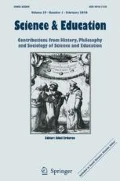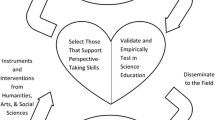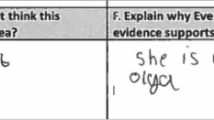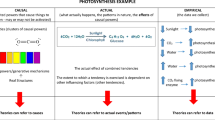Abstract
Perspective taking is a critical yet tangled construct that is used to describe a range of psychological processes and that is applied interchangeably with related constructs. The resulting ambiguity is particularly vexing in science education, where although perspective taking is recognized as critical to informed citizens’ ability to negotiate scientifically related societal issues, or socioscientific issues (SSI) via socioscientific reasoning (SSR), the precise nature of perspective taking remains elusive. To operationalize perspective taking, a theoretical conceptual analysis was employed and used to position perspective taking within the context of SSR. The resulting, more precise construct identified as socioscientific perspective taking (SSPT) requires engagement with others or their circumstances, an etic/emic shift in one’s viewpoint, and a moral context guided by conscience.





Similar content being viewed by others
Notes
We use the term “perspective taking” as a noun and “perspective-taking” (hyphenated) as a compound adjective to modify terms such as “tasks” and “behaviors.” We follow this convention in order to avoid confusion that might ensue from joining “taking” with the noun that it modifies. We follow this convention with “role taking” as well.
The terms “etic” and “emic” are used to describe social science research conducted from an outsider’s (“etic”) or insider’s (“emic”) vantage point. The terms were coined by Pike (1967) from the words “phonetic” and “phonemic” and align with the linguistic traditions of these latter terms.
References
Abd-El-Khalick, F. (2006). Socioscientific issues in pre-college science classrooms. In D. L. Zeidler (Ed.), The role of moral reasoning and discourse on socioscientific issues in science education (pp. 41–61). Dordrecht: Springer.
Aikenhead, G., & Ogawa, M. (2007). Indigenous knowledge and science revisited. Cultural Studies of Science Education, 2(3), 539–620.
Arendt, A. (1958). The human condition (2nd ed.). Chicago: University of Chicago Press.
Attenborough, R. (1982). Gandhi. [motion picture]. Los Angeles: Columbia Pictures.
Baron-Cohen, S. (1995). Mindblindness: An essay on autism and theory of mind. Boston: MIT Press/Bradford Books.
Baron-Cohen, S., Leslie, A. M., & Frith, U. (1985). Does the autistic child have a “theory of mind”? Cognition, 21(1), 37–46.
Barrow, R. (1990). The role of conceptual analysis in curriculum inquiry: a holistic approach. Journal of Curriculum and Supervision, 5(3), 269–278.
Batson, C. D. (1991). The altruism question: toward a social-psychological answer. Hillsdale: Lawrence Erlbaum Associates, Inc..
Bealer, G. (1998). Intuition and the autonomy of philosophy. In M. DePaul & W. Ramsey (Eds.), Rethinking intuition: The psychology of intuition and its role in philosophical inquiry (pp. 201–239). Lanham: Rowman & Littlefield.
Berkowitz, M. W. (1997). The complete moral person: anatomy and formation. In J. M. DuBois (Ed.), Moral issues in psychology: personalist contributions to selected problems (pp. 11–42). Lanham: University Press of America.
Clark, H. H., & Marshall, C. R. (1981). Definite reference and mutual knowledge. In A. K. Joshi, B. L. Webber, & I. A. Sag (Eds.), Elements of discourse understanding (pp. 10–63). Cambridge: Cambridge University Press.
Coombs, J. R., & Daniels, L. B. (1991). Philosophical inquiry: conceptual analysis. In E. C. Short (Ed.), Forms of curriculum inquiry (pp. 27–42). Albany: SUNY Press.
Corcoran, K., & Mallinckrodt, B. (2000). Adult attachment, self-efficacy, perspective-taking, and conflict resolution. Journal of Counseling & Development, 78, 473–483.
Denes-Raj, V., & Epstein, S. (1994). Conflict between intuitive and rational processing: when people behave against their better judgment. Journal of Personality and Social Psychology, 66(5), 819.
Denzin, N. K. (2017). The research act: a theoretical introduction to sociological methods. New York: Routledge.
Dewey, J. (1910). How we think. DC Heath: Lexington.
Douglas, M. (1970). Natural symbols: explorations in cosmology. London: Barrie & Rockliff.
Duveen, J., & Solomon, J. (1994). The great evolution trial: Use of role-play in the classroom. Journal of Research in Science Teaching, 31(5), 575–582.
Ennis, R. (1991). Critical thinking: a streamlined conception. Teaching Philosophy, 14(1), 5–24.
Erduran, S., Simon, S., & Osborne, J. (2004). TAPping into argumentation: Developments in the application of Toulmin’s argument pattern for studying science discourse. Science Education, 88, 915–933.
Evans, C., & Pollack, S. (1982). Tootsie. [motion picture]. Los Angeles: Columbia Pictures.
Fenigstein, A., & Abrams, D. (1993). Self-attention and the egocentric assumption of shared perspectives. Journal of Experimental Social Psychology, 29, 287–303.
Flavell, J. H. (1968). The development of role-taking and communication skills in children. New York: Wiley.
Flinders, D. J., Noddings, N., & Thornton, S. J. (1986). The null curriculum: Its theoretical basis and practical implications. Curriculum Inquiry, 16(1), 33–42.
Foster, S. J. (2001). Historical empathy in theory and practice: some final thoughts. In O. L. Davis, E. A. Yeager, & S. J. Foster (Eds.), Historical empathy and perspective taking in the social studies. Lanham: Rowman and Littlefield.
Fowler, S. R., Zeidler, D. L., & Sadler, T. D. (2009). Moral sensitivity in the context of socioscientific issues in high school science students. International Journal of Science Teacher Education, 31(2), 279–296.
Franks, D. D. (2013). Why we need neurosociology as well as social neuroscience: Or—why role-taking and theory of mind are different concepts. In D. D. Franks & J. H. Turner (Eds.), Handbook of neurosociology, handbooks of sociology and social research (pp. 27–32). Dordrecht: Springer Science & Business Media B.V.
Furberg, A., & Ludvigsen, S. (2008). Students’ meaning-making of socio-scientific issues in computer mediated settings: exploring learning through interaction trajectories. International Journal of Science Education, 30(13), 1775–1799.
Gibbs, J. C. (2003). Moral development and reality: beyond the theories of Kohlberg and Hoffman. Thousand Oaks: SAGE Publications.
Goetzman, G., & Demme, J. (1991). The silence of the lambs. [motion picture]. Los Angeles: Orion Pictures.
Green, T. F. (1964). A topology of the teaching concept. Studies in Philosophy and Education, 3(4), 284–319.
Green, T. F. (1971). The activities of teaching. New York: McGraw-Hill.
Green, T.F. (1975). Perspectives on thinking about change. Report for Exploration Fund of the Kettering Foundation.
Green, T. F. (1999). Voices: The educational formation of conscience. Notre Dame: University of Notre Dame.
Greene, J. A., Sandoval, W. A., & Braten, I. (Eds.). (2016). Handbook of epistemic cognition. New York: Routledge.
Grove, R., & Short, E. C. (1991). Theoretical inquiry: components and structure. Forms of Curriculum Inquiry, 211–224.
Guber, P., & Levinson, B. (1988). Rain man [motion picture]. Los Angeles: MGM/UA Distribution Company.
Guskey, T. R. (2002). Professional development and teacher change. Teachers and Teaching: Theory and Practice, 8(3), 381–391.
Gutstein, S. E., & Whitney, T. (2002). Asperger syndrome and the development of social competence. Focus on Autism and Other Developmental Disabilities, 17(3), 161–171.
Haidt, J. (2012). The righteous mind: why good people are divided by politics and religion. New York: Pantheon.
Harris, S. (2010). The moral landscape: how science can determine human values. New York: Simon and Schuster.
Hoffman, M. L. (2000). Empathy and moral development: implications for caring and justice. Cambridge: Cambridge University Press.
Hollan, D., & Throop, C. J. (2008). Whatever happened to empathy?: introduction. Ethos, 36(4), 385–401.
Iñárritu, A. G. (2009). The Three Amigos of Cha Cha Cha. The New York Times. http://www.nytimes.com/2009/04/26/movies/26roht.html?pagewanted=all&_r=0.
Jackson, F. (1998). From metaphysics to ethics: A defense of conceptual analysis. Oxford: Oxford University Press.
James, B. (1984). The Bill James baseball abstract. New York: Ballantine Books.
Jiménez-Aleixandre, M. P., & Erduran, S. (2007). Argumentation in science education: an overview. In S. Erduran & Jiménez-Aleixandre (Eds.), Argumentation in science education: perspectives from classroom-based research (pp. 3–28). Dordrecht: Springer.
Kahan, D. (2012). Cultural cognition as a conception of the cultural theory of risk. In R. Hillerbrand, P. Sandin, S. Roeser, & M. Peterson (Eds.), Handbook of risk theory: epistemology, decision theory, ethics and social implications of risk (pp. 725–760). London: Springer.
Kahn, S., & Zeidler, D. L. (2017). A case for the use of conceptual analysis in science education research. Journal of Research in Science Teaching, 54(4), 538–551.
Killen, M., & Smetana, J. (2006). Handbook of moral development. Mahwah: Lawrence Erlbaum Associates, Inc..
King, P. M., & Kitchener, K. S. (2004). Reflective judgment: theory and research on the development of epistemic assumptions through adulthood. Educational Psychologist, 39(1), 5–18.
Kohlberg, L. (1968). Early education: a cognitive developmental approach. Child Development, 39, 1013–1062.
Komisar, B. P. (1968). Teaching: Act and enterprise. Studies in Philosophy and Education, 6(2), 168–193.
Kornblith, H. (2002). Knowledge and its place in nature. Oxford: Oxford University Press.
Krathwohl, D. R. (1993). Methods of educational and social science research: an integrated approach. New York: Longman.
Krauss, R. M., & Fussell, S. R. (1996). Social psychological models of interpersonal communication. In E. T. Higgins & A. Kruglanski (Eds.), Social psychology: handbook of basic principles (pp. 655–701). New York: Guilford Press.
Latour, B., & Woolgar, S. (1986). Laboratory life: the construction of scientific facts (2nd ed.). Princeton: Princeton University Press.
Lazenby, H. (2016). What is equality of opportunity in education? Theory and Research in Education, 14(1), 65–76.
Lee, P., & Ashby, R. (2001). Empathy, perspective taking, and rational understanding. In O. L. Davis Jr., E. A. Yeager, & S. J. Foster (Eds.), Historical empathy and perspective taking in the social studies (pp. 21–50). Lanham: Rowman & Littlefield Publishers, Inc..
Lee, H., Chang, H., Choi, K., Kim, S. W., & Zeidler, D. L. (2012). Developing character and values for global citizens: analysis of pre-service science teachers’ moral reasoning on socioscientific issues. International Journal of Science Education, 34(6), 925–953.
Lee, H., Yoo, J., Choi, K., Kim, S., Krajcik, J., Herman, B., & Zeidler, D. L. (2013). Socioscientific issues as a vehicle for promoting character and values for global citizens. International Journal of Science Education, 35(12), 2079–2113.
Martin, J., Sokol, B. W., & Elfers, T. (2008). Taking and coordinating perspectives: from prereflective interactivity, through reflective intersubjectivity, to metareflective sociality. Human Development, 51(5–6), 294–317.
McGinnis, J. R. (2003). The morality of inclusive verses exclusive settings. In D. L. Zeidler (Ed.), The role of moral reasoning on socioscientific issues and discourse in science education (pp. 195–216). Dordrecht: Springer.
Melville, W., Yaxley, B., & Wallace, J. (2007). Virtues, teacher professional expertise, and socioscientific issues. Canadian Journal of Environmental Education, 12, 95–109.
Minshew, N. J., & Keller, T. A. (2010). The nature of brain dysfunction in autism: functional brain imaging studies. Current Opinion in Neurology, 23(2), 124.
Monash, P., & De Palma, B. (1976). Carrie. [Motion Picture]. Los Angeles: United Artists.
Monroe, S. M., & Harkness, K. L. (2011). Recurrence in major depression: a conceptual analysis. Psychological Review, 118(4), 655.
National Research Council. (2012). A Framework for K-12 Science Education: Practices, Crosscutting Concepts, and Core Ideas. Washington, DC: The National Academies Press.
National Science Teachers Association (NSTA). (2016). NSTA Position Statement: Teaching Science in the Context of Societal and Personal Issues.
Neumann, R., Parry, S., & Becher, T. (2002). Teaching and learning in their disciplinary contexts: A conceptual analysis. Studies in Higher Education, 27(4), 405–417.
Next Generation Science Standards Lead States. (2013). Next generation science standards: for states, by states. Washington, DC: The National Academies Press.
Nilsen, E. S., & Fecica, A. M. (2011). A model of communicative perspective-taking for typical and atypical populations of children. Developmental Review, 31(1), 55–78.
Nucci, L. (2001). Education in the moral domain. Cambridge: Cambridge University Press.
Pakula, A. J., & Mulligan, R. (1962). To kill a mockingbird.[motion picture]. Universal City: Universal Studios.
Papineau, D. (1993). Philosophical naturalism. Oxford: Blackwell.
Piaget, J. (1926). The language and thought of the child. New York: Harcourt Brace.
Pike, K. L. (1967). Etic and emic standpoints for the description of behavior. In K. L. Pike (Ed.), Language in relation to a unified theory of the structure of human behavior (pp. 37–72). The Hague: Mouton & Co..
Premack, D., & Woodruff, G. (1978). Does the chimpanzee have a ‘theory of mind’? Behavioral and Brain Sciences, 4, 515–526.
Raz, J. (1990). Practical reason and norms. Princeton: Princeton University Press.
Roberts, D. A. (2007). Scientific literacy/Science literacy. In S. K. Abell & N. G. Lederman (Eds.), Handbook of research on science education (pp. 729–280). Mahwah: Lawrence Erlbaum Associates.
Roberts, D. A. (2011). Competing visions of scientific literacy: the influence of a science curriculum policy image. In C. Linder, L. Ostman, D. A. Roberts, P. Wickman, G. Erickson, & A. MacKinnon (Eds.), Promoting scientific literacy: science education research in transaction (pp. 11–27). New York: Routledge/Taylor & Francis Group.
Roberts, D. A., & Bybee, R. W. (2014). Scientific literacy, science literacy, and science education. In N. G. Lederman & S. K. Abell (Eds.), Handbook of research in science education (Vol. II, pp. 545–558). New York: Routledge.
Rogers, R. R. (2001). Reflection in higher education: A concept analysis. Innovative Higher Education, 26(1), 37–57.
Sadler, T. (2004). Moral sensitivity and its contribution to the resolution of socio-scientific issues. Journal of Moral Education, 33(3), 339–358.
Sadler, T. D., & Donnelly, L. A. (2006). Socioscientific argumentation: The effects of content knowledge and morality. International Journal of Science Education, 28(12), 1463–1488.
Sadler, T. D., & Zeidler, D. L. (2003). Scientific errors, atrocities and blunders. In D. L. Zeidler (Ed.), The role of moral reasoning and discourse on socioscientific issues in science education (pp. 261–285). Dordrecht: Kluwer.
Sadler, T. D., & Zeidler, D. L. (2005). Patterns of informal reasoning in the context of socioscientific decision making. Journal of Research in Science Teaching, 42(1), 112–138.
Sadler, T. D., Barab, S. A., & Scott, B. (2007). What do students gain by engaging in socioscientific inquiry? Research in Science Education, 37, 371–391.
Sadler, T. D., Klosterman, M. L., & Topcu, M. S. (2011). Learning science content and socio scientific reasoning through classroom explorations of global climate change. In T. D. Sadler (Ed.), Socio-scientific issues in the classroom (pp. 45–77). Dordrecht: Springer.
Selman, R. L. (1971a). The relation of role taking to the development of moral judgment in children. Child Development, 42, 79–91.
Selman, R. L. (1971b). Taking another’s perspective: role-taking development in early childhood. Child Development, 42(6), 1721–1734.
Selman, R. L. (1977). A structural-developmental model of social cognition: implications for intervention research. The Counseling Psychologist, 6(4), 3–6.
Schaafsma, S. M., Pfaff, D. W., Spunt, R. P., & Adolphs, R. (2015). Deconstructing and reconstructing theory of mind. Trends in Cognitive Sciences, 19(2), 65–72.
Scheffler, I. (1960). The language of education. Springfield: Thomas.
Sider, T. (2001). Criteria of personal identity and the limits of conceptual analysis. Noûs, 35, 189–209.
Simonneaux, L. (2008). Argumentation in socio-scientific contexts. Argumentation in Science Education. In S. Erduran & M. P. Jiménez-Aleixandre (Eds.), Argumentation in science education: Perspectives from classroom-based research (pp. 179–199). Dordrecht: Springer.
Smith, B. (1960). A concept of teaching. The Teachers College Record, 61(5), 229–241.
Smith, J., & Ross, H. (2007). Training parents to mediate sibling disputes affects children's negotiations and conflict understanding. Child Development, 78(3), 790–805.
Sobel, D. (1999). Galileo's daughter: A historical memoir of science, faith, and love. New York: Walker & Co.
Soltis, J. F. (1978). An introduction to the analysis of educational concepts (2nd ed.). Boston: Addison-Wesley Publishing Company.
Verducci, S. (2000). A moral method? Thoughts on cultivating empathy through method acting. Journal of Moral Education, 29(1), 87–89.
Vilardaga, R. (2009). A relational frame theory account of empathy. International Journal of Behavioral Consultation and Therapy, 5(2), 178–184.
Walker, L. J. (1980). Cognitive and perspective-taking prerequisites for moral development. Child Development, 51, 131–139.
Walker, M., & Rogers, W. (2018). A new approach to defining disease. The Journal of Medicine and Philosophy, 43(4), 402–420.
Wilson, J. (1963). Thinking with concepts. Cambridge: Cambridge University Press.
Wittek, L., & Kvernbekk, T. (2011). On the problems of asking for a definition of quality in education. Scandinavian Journal of Educational Research, 55(6), 671–684.
Wu, Y. T., & Tsai, C. C. (2007). High school students’ informal reasoning on a socio-scientific issue: qualitative and quantitative analyses. International Journal of Science Education, 29(9), 1163–1187.
Zeidler, D. L. (2014). Socioscientific issues as a curriculum emphasis: theory, research, and practice. In N. G. Lederman & S. K. Abell (Eds.), Handbook of research on science education (Vol. II, pp. 697–726). New York: Routledge.
Zeidler, D. L., & Kahn, S. (2014). It’s debatable: using socioscientific issues to develop scientific literacy, K-12. Arlington: NSTA Press.
Zeidler, D. L., & Keefer, M. (2003). The role of moral reasoning and the status of socio-scientific issues in science education. In D. L. Zeidler (Ed.), The role of moral reasoning on socio- scientific issues and discourse in science education (pp. 7–38). Dordrecht: Kluwer Academic Publishers.
Zeidler, D. L., & Sadler, T. D. (2008). The role of moral reasoning in argumentation: conscience, character and care. In S. Erduran & M. Pilar Jimenez-Aleixandre (Eds.), Argumentation in science education: perspectives from classroom-based research (pp. 201–216). Dordrecht: Springer Press.
Zeidler, D. L., & Sadler, D. L. (2011). An inclusive view of scientific literacy: core issues and future directions of socioscientific reasoning. In C. Linder, L. Ostman, D. A. Roberts, P. Wickman, G. Erickson, A. MacKinnon, & A. (Eds.), Promoting scientific literacy: Science education research in transaction (pp. 176–192). Routledge / Taylor & Francis Group: New York.
Zeidler, D. L., Sadler, T. D., Simmons, M. L., & Howes, E. V. (2005). Beyond STS: a research-based framework for socio-scientific issues education. Science Education, 89(3), 357–377.
Zeidler, D. L., Berkowitz, M. W., & Bennett, K. (2013). Thinking (scientifically) responsibly: the cultivation of character in a global science education community. In M. P. Mueller et al. (Eds.), Assessing schools for generation R (responsibility), contemporary trends and issues in science education 41 (pp. 83–99). Dordrecht: Springer.
Author information
Authors and Affiliations
Corresponding author
Ethics declarations
Conflict of Interest
The authors declare that they have no conflict of interest.
Additional information
Publisher’s Note
Springer Nature remains neutral with regard to jurisdictional claims in published maps and institutional affiliations.
Rights and permissions
About this article
Cite this article
Kahn, S., Zeidler, D.L. A Conceptual Analysis of Perspective Taking in Support of Socioscientific Reasoning. Sci & Educ 28, 605–638 (2019). https://doi.org/10.1007/s11191-019-00044-2
Published:
Issue Date:
DOI: https://doi.org/10.1007/s11191-019-00044-2




